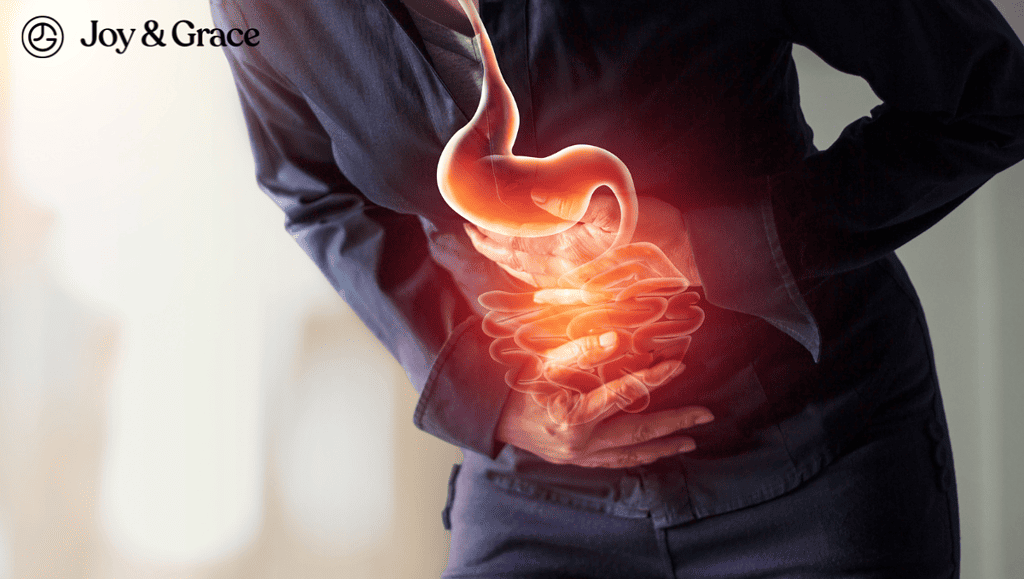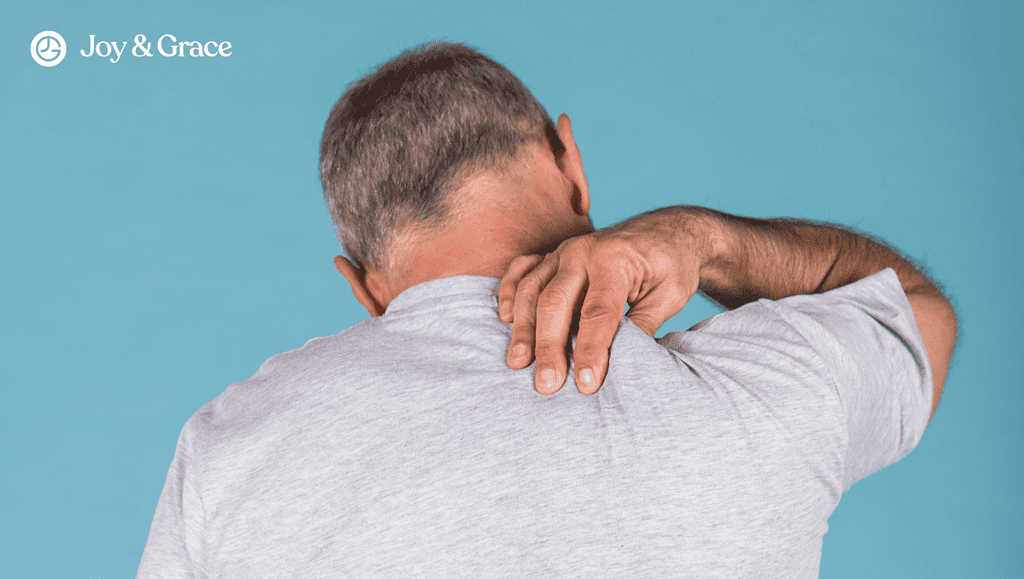There are times when everyone has had a meal that didn't agree with their body. Most of the time, it shows up as the usual bloating, stomach cramps, and the need to use the toilet. That said, could a newfound dull ache or burning pain in your shoulder blades actually be caused by a problem in the gut?
Can Gastritis Cause Back and Shoulder Pain?
The stomach pain from gastritis may diffusely radiate to the middle back, potentially up to the lower parts of the shoulder blades. However, gastritis is not a direct cause of isolated back and shoulder pain.
Besides the radiating pain, no studies suggest that gastritis can cause sole back and shoulder pain.
Still, there could be some indirect links:
If the pain from gastritis is severe and/or longstanding, it could lead to somatization. Somatization is when emotional or psychological pain is turned into physical symptoms that have nothing to do with the body. It's like when your feelings get so big that they hurt or make you feel bad even though nothing is physically wrong.
That could be a potential indirect link between gastritis and shoulder symptoms. But it’s important to note that this mechanism is usually the last thing doctors consider. That means they take a comprehensive medical history and perform a careful physical exam to rule out any physical cause behind the pain before thinking of a psycho-somatic relation.
Overall, if you have back and shoulder pain that doesn't go away or gets worse, you should see a doctor to rule out any possible underlying causes. Gastritis is not usually the main cause of isolated back and shoulder pain. Still, it's always important to see a doctor to get an accurate diagnosis and the right treatment.
Can Gastric Ulcers Cause Back Pain Between Shoulder Blades?
Gastric ulcers, a potential complication of gastritis, can cause stomach pain that radiates to the lower part of the area between the shoulder blades, similar to what we explained earlier.
Isolated back pain between the shoulder blades, without stomach pain, is usually not caused by gastric ulcers.
Can GERD Cause Back Pain Between Shoulder Blades?
GERD stands for Gastroesophageal Reflux Disease. When you have GERD, acid from your stomach leaks back into your esophagus (food pipe) and irritates it.
This leak is also called acid reflux.
Spicy or acidic foods and drinks can also aggravate it. Unlike gastritis, which is mostly localized to the stomach, GERD usually involves the esophagus. When the esophagus is irritated, the pain may also be felt in the back and lower parts of the shoulder blades and worsened by the need to cough.
This pain and the urge to cough are sometimes considered heartburn, depicting the chest pain that feels like a "burning" sensation near the heart.
Can Indigestion Cause Back Pain Between Shoulder Blades?
People with indigestion or dyspepsia usually feel bloated and have abdominal pain. Indigestion, on its own, may not cause shoulder and back pain. However, someone with indigestion might also have gastritis, GERD, or other stomach problems. In this case, it's possible that the underlying medical condition can explain the back shoulder pain, back pain and cause indigestion.
What Helps with Gastritis and Possible Back and Shoulder Pain?
There are many ways to ease the pain of gastritis, including the pain in the back and shoulder blades. One idea is to drink more liquids, like water, and eat smaller, more frequent meals instead of one big meal.
During attacks or pain flare-ups, taking some time to rest can be helpful. For pain and discomfort after meals, antacids may provide some relief. In some cases, pain symptoms can get better if you stay away from stress, smoking, and alcohol for a while.
What Is Gastritis?

Gastritis is inflammation and swelling of the stomach lining. It is usually not contagious and can have different causes. If you have gastritis, you may tend to feel bloated and uncomfortable. Sometimes, you might have severe stomach pains. In some cases, you may feel nauseated and even vomit. Less commonly, pain can creep from the stomach toward the back and even the shoulder blades.
Gastritis and Gastric Ulcers
There are many reasons why you may get gastric ulcers. Some of these could include:
- Heredity. Having gastric ulcers may run in the family.
- Stress. People reporting stress at home or work may be at risk for ulcers.
- Smoking. Smoking is known to cause or worsen gastric ulcers.
- Diet. A highly acidic diet may put you at risk of developing stomach ulcers. On the other hand, having a nutritionally balanced diet throughout the day can protect you from developing ulcers.
- Drugs. Drugs. Certain substances and medications increase the risk of gastric ulcers. One example is some over-the-counter pain medications like ibuprofen.
Another possibility is that you have gastritis, which can lead to sores or ulcers in the stomach lining. In these cases, gastritis (or the bacteria causing it) may have led to the weakened lining of your stomach. This can then lead to a gastric ulcer and worsening symptoms like discomfort after eating and pain, which can start in the abdomen and spread throughout the body.
Types of Gastritis
There are several types of gastritis, depending on their cause and duration.
Acute gastritis is short-term and usually caused by overeating or consuming certain foods. Alcohol consumption and smoking can also trigger acute gastritis pain. Bacterial infections can also cause acute gastritis, which can become chronic gastritis over time.
Chronic gastritis is long-lasting and typically caused by an untreated bacterial infection. Bacteria which can enter the stomach through contaminated water or food, are usually the cause. This type of gastritis can last from weeks to years without treatment.
Gastritis can sometimes happen to people with autoimmune diseases like Crohn's disease, vasculitis, etc. Depending on the specific cause, these people may also have other symptoms, such as weight loss and anemia.
Gastritis can also be caused by taking too many medicines like aspirin and nonsteroidal anti-inflammatory drugs (NSAIDs).
What Are the Symptoms of Chronic Gastritis?
Chronic gastritis can typically cause bloating and pain like acute gastritis but with on-and-off periods over time.
You may experience loss of appetite and recurring nausea with or without vomiting with chronic gastritis. Depending on what's causing chronic gastritis, it can also make you tired and make it hard to sleep.
Other common symptoms include belching, indigestion, and upper abdominal pain.
What Are the Causes of Chronic Gastritis?
Chronic gastritis is often caused by an old stomach infection that wasn't treated. The most common culprit for gastritis is H. pylori, which lives in the stomach and affects the lining.
There are many other lifestyle reasons behind developing this chronic disease. Most of these take time and gradually lead to the person feeling pain and discomfort.
A poor diet can lead to the production of excess acid that damages the stomach wall.
Stress can cause the body to make more hormones, changing how much stomach acid is produced.
Certain drugs, including painkillers and antibiotics, can irritate the stomach lining.
Drinking alcohol and cigarette smoking both increase the risk of developing gastritis.
If you have an autoimmune disorder like Crohn's disease, ulcerative colitis, celiac disease, etc., you may also be at risk for chronic and recurring gastritis.
What Is Phlegmonous Gastritis?
Phlegmonous gastritis, is a very rare and severe form of gastritis. It is caused by a severe bacterial infection of the middle layer of the stomach wall. When this happens, pus builds up inside the stomach wall, which causes swelling, pain, fever, and vomiting. This kind of gastritis is a medical emergency that must be taken care of immediately.
What Does H. Pylori Have to Do with Gastritis?
H. pylori is a bacterium that lives in the stomach and intestines of humans. It is one of the most likely causes of acute and chronic gastritis. It usually burrows into the lining of the stomach. This makes the stomach more likely to get ulcers, which bleed and hurt.
H. pylori infections are treated using a specific set of antibiotics. If your doctor suspects that H. pylori is causing your symptoms, they can test you and give you the right medicine for relief and treatment.
What Can I Eat with Gastritis?

When you have gastritis, the lining of your stomach is already sensitive. This makes it weak to further injury from food and drinks that can directly irritate it. The stomach is also sensitive to its own acid.
You might feel better if you ate less whole grains and high-protein foods like:
- Meat
- Chicken
- Fish
- Eggs
- Milk
- Cheese
- Beans
- Nuts
- Seeds
- Soy products
- Tofu
- Lentils
Heavy food filled with protein and fat could fill the stomach with acid and cause more harm. Simple, regular meals with lean meats, easy-to-digest vegetables, and other healthy foods could help you.
Foods rich in fat, such as butter, cream, margarine, shortening, and oils, should be limited. In the meantime, you should also avoid spicy and acidic foods and drinks like coffee, tea, citrus fruits, peppers, and the like. Alcohol consumption should be minimized. Lastly, if possible, sugar intake should be reduced.
When To Call 911
Gastritis is typically not an emergency situation. If you have sudden, severe pain that keeps you from working or sleeping, you should see a doctor as soon as possible. The type of pain that worsens over time or the worsening of other symptoms is also a warning sign. Vomiting and bleeding are also signs of seeking a medical professional.
Takeaway
While gastritis may cause pain that radiates to the back and shoulder blades, it is not the sole culprit of isolated back and shoulder pain.
It's essential to recognize that there could be indirect links, such as somatization, where emotional distress manifests as physical symptoms. However, healthcare professionals typically prioritize investigating physical causes before considering psychological factors. Therefore, consulting a healthcare provider is crucial to rule out any potential underlying causes and receive an accurate diagnosis and appropriate treatment.
Remember, while gastritis alone may not be the primary source, seeking medical care is essential for managing and addressing any persistent or worsening back and shoulder pain.
Have you had any food horror stories or weird reactions to last night's meal? Share your stomach stories (and how you found your happy ending) in the comments below. Sign up for our newsletter to always be in the know with our reliable health advice!















